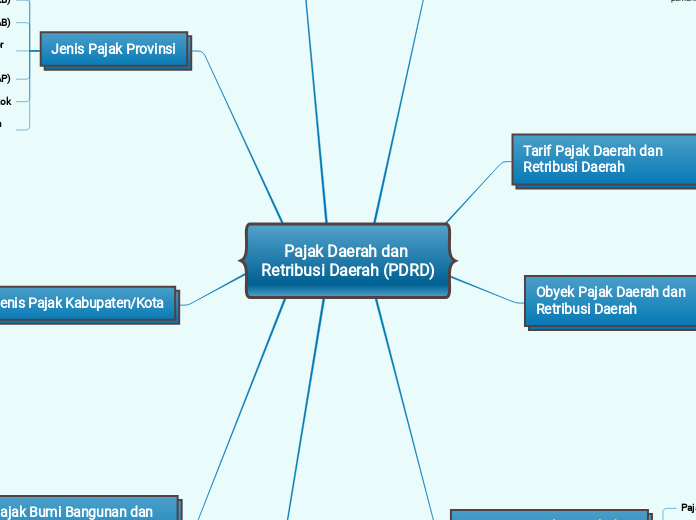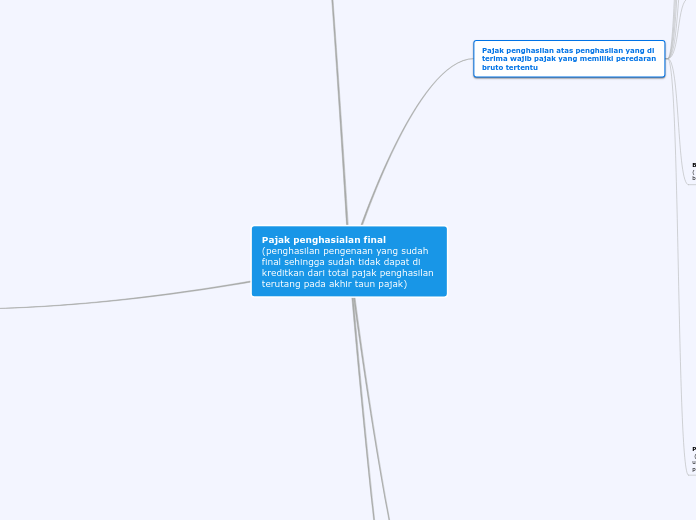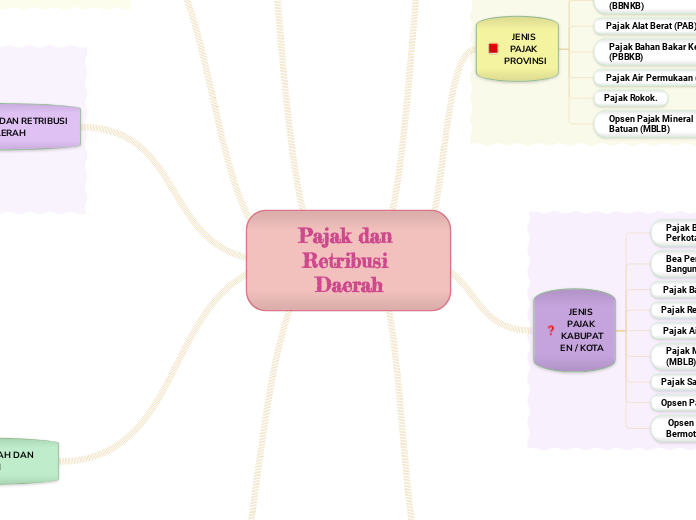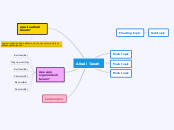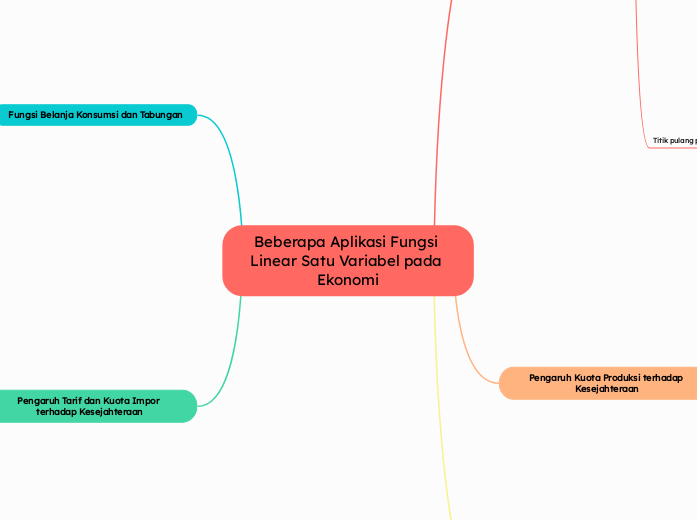Pajak Daerah dan Retribusi Daerah (PDRD)
The part of speech is a category to which a word is assigned according to its syntactic functions. In English the main parts of speech are noun, pronoun, adjective, determiner, verb, adverb, preposition, conjunction, and interjection.
Tarif dan Jenis Pajak Daerah dan Retribusi Daerah
A conjunction is a word like 'if' 'but' or 'and' which is used to connect sentences or clauses together.
Subordinating conjunctions are conjunctions that are used at the beginning of subordinate clauses. Some examples of these conjunctions are: although, after, before, because, how, if, once, since, so that, until, unless, when etc.
Tarif : Ditentukan berdasarkan biaya penyedia layanan
Jenis : Retribusi jasa umum, retribusi jasa usaha, retribusi perizinan
Coordinating conjunctions always connect phrases, words, and clauses. They are: for, and, nor, but, or, yet, so.
Tarif : Maksimal 10% (kecuali pajak rokok hingga 100%)
Jenis : PKB, BBNKB, PBBKB, Pajak air tanah, pajak tokok, dll
J
Pajak Bumi Bangunan dan Bea Perolehan Hak Atas Tanah dan Bangunan
A preposition is one of the most exciting parts of grammar. A preposition is used to describe the location of something in relation to something else.
BPHTB
A group of words used with the force of a single preposition is called phrase preposition.
-Dipungut satu kali pada waktu memperoleh hak atas bumi/tanah dan/atau bangunan
-Subjek pajaknya adalah orang pribadi atau badan hukum yang memperoleh hak atas tanah dan/atau bangunan
-Tarif Maksimal 5% dari nilai transsaksi
PBB
Participle preposition consists of words that end in “ing”.
-Dipungut setiap tahun atas bumi/tanah dan atau bangunan
-Subjek pajaknya adalah orang atau badan yang secara nyata mempunyai suatu hak atas bumi/tanah dan/atau memperoleh manfaat atas bangunan
-Tarif maksimal 0,3% dari nilai jual objek pajak
Jenis Pajak Kabupaten/Kota
An interjection is used to express emotion in a sentence.
Think of other interjections!
Opsen Bea Balik Nama Kendaraan Bermotor (BBNKB)
Opsen Pajak Kendaraan Bermotor (PKB)
Pajak Sarang Burung Walet
Pajak Mineral Bukan Logam dan Batuan (MBLB)
Pajak Air Tanah(PAT)
Pajak Reklame
Pajak Barang dan Jasa Tertentu (PBJT)
Bea Perolehan Hak atas Tanah dan Bangunan (BPHTB)
Pajak Bumi dan Bangunan Perdesaan dan Perkotaan (PBB-P2)
Jenis Pajak Provinsi
An adverb is used to describe a verb, but it can also describe an adjective or another adverb.
Adverbs normally help paint a fuller picture by describing how something happens.
Opsen Pajak Mineral Bukan Logam dan Batuan (MBLB)
Pajak Rokok
Especially, Specifically, Merely, Either
Pajak Air Permukaan (PAP)
A lot, Little, Much
Pajak Bahan Bakar Kendaraan Bermotor (PBBKB)
The intensifiers strengthen adverbs adjectives and adverbs and down- toners make them weaker.
Pajak Alat Berat (PAB)
Just, Afterward, Soon, Currently
Pajak kendaraan bermotor (PKB)
Bea Balik Nama Kendaraan Bermotor (BBNKB)
Create sentences
Always, usually, Never
Pembagian Hasil Pajak Provinsi dan Kabupaten/Kota
A numeral is a word or phrase that describes a numerical quantity.
Some theories of grammar use the word 'numeral' to refer to cardinal numbers that act as a determiner to specify the quantity of a noun, for example the 'two' in 'two hats'.
Pajak Kabupaten/Kota
19% untuk pemerintah daerah provinsi
64,8% untuk pemerintah daerah kabupaten/kota
16,2% untuk pemerintah pusat
Pajak Provinsi
100% menjadi pendapatan provinsi masing-masing setelah dikurangi bagian pemerintah pusat
Peraturan Pajak Daerah dan Retribusi Daerah
An article is a word used to modify a noun, which is a person, place, object, or idea. Technically, an article is an adjective, which is any word that modifies a noun.
Indefinite articles are the words 'a' and 'an.' Each of these articles is used to refer to a noun, but the noun being referred to is not a specific person, place, object, or idea. It can be any noun from a group of nouns.
-Diatur dalam UU No.28 Tahun 2009
-Jenis retribusi ditetapkan dalam UU tersebut
- Tarif restribusi ditetapkan dalam perda masing-masing daerah berdasarkan biaya penyediaan layanan
It refers directly to a specific noun or groups of nouns.
-Diatur dalam UU No.28 Tahun 2009
-Jenis pajak ditetapkan dalam UU tersebut
-Tarif pajak ditetapkan dalam perda masing-masing daerah dengan batas maksimal 10% (kecuali pajak rokok hingga 100%)
Obyek Pajak Daerah dan Retribusi Daerah
A pronoun is a word that can be used in place of a noun, typically after the noun itself has already been stated.
Obyek Retribusi Daerah
Demonstrative pronouns are used to demonstrate (or indicate). This, that, these, and those are all demonstrative pronouns.
_Pelayanan Kesehatan di Puskesmas, Rumah Sakit Daerah, dll
-Pelayanan persampahan/kebersihan
-Penggunaan fasilitas pasar, terminal, tempat parkir, taman dan jalan umum
-Izin mendirikan bangunan, izin usaha, dll
Obyek Pajak Daerah
Possessive pronouns are used to show possession. The possessive pronouns are mine, yours, his, hers, ours, and theirs.
-Pajak kendaraan bermotor dan kendaraan di atas air
-Bahan bakar kendaraan bermotor
-Pengambilan air permukaan
-Penerangan Jalan
-Reklame, dll
Tarif Pajak Daerah dan Retribusi Daerah
A noun is defined as a person, place, thing or idea. Proper nouns always begin with a capital letter. Common nouns, which are general words, such as 'cars,' are not capitalized.
Tarif Retribusi Daerah
Compound nouns are words where two nouns have been stuck together to make a new noun. Compound nouns should be written as one word, without a hyphen.
Ditetapkan dengan perhitungan biaya penyediaan layanan (Cost Recovery)
Tarif Pajak Daerah
-Maksimal 10% dari dasar pengenaan pajak.
-Kecuali pajak rokok dengan tarif maksimal 100%
Pengertian
A verb is an action word or 'doing' word that signifies movement in some way.
Retribusi Daerah
An auxiliary verb helps the main (full) verb and is also called a 'helping verb.' With auxiliary verbs, you can write sentences in different tenses, moods, or voices.
Retribusi Daerah adalah pembayaran yang harus dikeluarkan oleh individu atau badan usaha kepada pemerintah daerah sebagai imbalan atas pelayanan atau fasilitas yang diberikan oleh pemerintah kepada mereka.
Pajak Daerah
A modal is a type of auxiliary (helping) verb that is used to express: ability, possibility, permission or obligation. The main modal verbs in the English language are: can, could, may, might, must, shall, should, will, would.
Pajak Daerah adalah iuran wajib yang harus dibayar oleh warga atau badan usaha kepada pemerintah daerah tanpa mendapatkan imbalan secara langsung dalam bentuk layanan tertentu.
